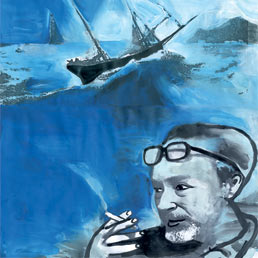Inviare un messaggio
In risposta a:
PRIMO LEVI. Quando Levi morì (11 aprile 1987), Claudio Magris scrisse un articolo che cominciava così: «È morto un autore le cui opere ce le troveremo di fronte al momento del Giudizio Universale». Un ricordo di Ferdinando Camon - a cura di pfls
[...]«C’è Auschwitz, quindi non può esserci Dio». [...] «Non trovo una soluzione al (...)
In risposta a:
> The Mystery of Primo Levi (Tim Parks) --- The Complete Works of Primo Levi - edited by Ann Goldstein, with an introduction by Toni Morrison
The Mystery of Primo Levi
Tim Parks
- The Complete Works of Primo Levi
 edited by Ann Goldstein, with an introduction by Toni Morrison
edited by Ann Goldstein, with an introduction by Toni Morrison
 Liveright, three volumes, 2,910 pp., $100.00
Liveright, three volumes, 2,910 pp., $100.00
Primo Levi was born in 1919 on the fourth floor of an “undistinguished” apartment block in Turin and aside from “involuntary interruptions” continued to live there in the company of his mother until in 1987 he threw himself down the stairwell to his death. The longest interruption was from September 1943 to October 1945 and would provide Levi with the core material for his writing career: it involved three months on the fringe of the partisan resistance to the German occupation, two months in a Fascist internment camp, eleven months in Auschwitz, and a further nine in various Russian refugee camps.
In 1946, aged twenty-seven, despite working full-time as a chemist, Levi completed his account of his time in a concentration camp. Now widely considered a masterpiece, If This Is a Man was turned down by Turin’s main publishing house, Einaudi, in the person of Natalia Ginzburg, herself a Jew whose husband had died in a Fascist prison. It was also rejected by five other publishers. Why? [...] (The New York Review of Books, November 5, 2015)
Questo forum è moderato a priori: il tuo contributo apparirà solo dopo essere stato approvato da un amministratore del sito.